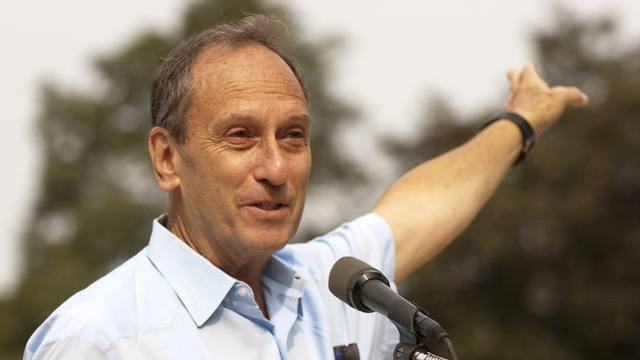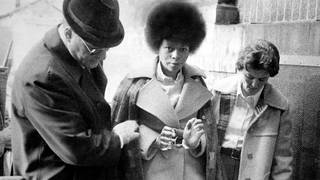
Topics
The award-winning journalist, filmmaker, author and professor Saul Landau has died at the age of 77. His death was confirmed by the Institute for Policy Studies where he was a senior fellow and vice chair of the IPS board. Landau made more than 45 films and wrote 14 books, many about Cuba. “He stood up to dictators, right-wing Cuban assassins, pompous politicians, and critics from both the left and the right,” IPS Director John Cavanagh said in a statement from the group. “When he believed in something, nobody could make him back down. Those who tried would typically find themselves on the receiving end of a withering but humorous insult.”
Landau’s recent film, “Will the Real Terrorist Please Stand Up?” exposed U.S. support for violent anti-Castro militants. Last year, Landau appeared on Democracy Now! to discuss the history of the Cuban Five and U.S. support for a group of anti-Castro militants who have been behind the bombing of airplanes, the blowing up of hotels and assassinations. Today, they are allowed to live freely in the United States. “What did Cuba do to us?,” Landau asks. “Well, the answer, I think, is that they were disobedient, in our hemisphere. And they did not ask permission to take away property. They took it away. They nationalized property. And the United States … has never forgiven them.”
Landau is survived by his wife, Rebecca Switzer, his first wife, Nina Serrano, and his five children, seven grandchildren and four great-grandchildren.
The Institute for Policy Studies released the following statement:
The Institute for Policy Studies Mourns the Loss of Filmmaker and Author Saul Landau
(Washington, D.C., September 10, 2013) Institute for Policy Studies staff and friends are mourning the loss of Saul Landau, an award-winning filmmaker, author, poet, and fearless human rights activist. Saul was an IPS Fellow from 1972 until his death on September 9, 2013, from cancer at age 77.
Saul produced more than 40 films and TV programs, 14 books, and thousands of newspaper and magazine articles and reviews. Among his numerous accolades, Saul received an Emmy and a George Polk Award for “Paul Jacobs and the Nuclear Gang,” a film he directed with Jack Willis in 1980 about the cover-up of health hazards related to 1950s atomic bomb testing.
Beyond his extensive body of work, Saul will be remembered for his steely nerve and caustic wit. “He stood up to dictators, right-wing Cuban assassins, pompous politicians, and critics from both the left and the right,” said IPS Director John Cavanagh. “When he believed in something, nobody could make him back down. Those who tried would typically find themselves on the receiving end of a withering but humorous insult.”
Saul constantly mocked the hypocrisy he saw in U.S. policies, particularly in Latin America. His last film, “Will the Real Terrorist Please Stand Up?” tells the history of U.S.-Cuban relations through the lens of the Cuban 5, a group sent to infiltrate right-wing terrorist organizations in Miami. When the spies turned over evidence of U.S.-based terrorism to the FBI, they themselves were arrested and convicted while the anti-Castro terrorists continued to live freely in Florida. Several times in the last years of his life, Saul joined actor Danny Glover in driving hours across the California desert to visit one of the Cuban 5 prisoners.
Over the course of his career, Saul made six films about Cuba. His most popular was the 1968 PBS documentary “Fidel,” shot during a week-long jeep tour of the country that allowed him unprecedented access to the controversial Cuban leader. New York and Los Angeles premieres of the film were both canceled after firebomb attacks on the theaters. “These right-wing Cubans had, how shall I say it, ‘strong views’ on free speech,” Saul later commented. At the time of his death, he had yet another Cuba film in the works, this one on the fight against homophobia in that country. The Cuban Institute for Friendship with the Peoples (ICAP) awarded him the Medal of Friendship on August 7, 2013.
In 1971, Saul released two films about the election of Chilean President Salvador Allende, Latin America’s first democratically elected socialist leader, including one with singer/songwriter Country Joe McDonald. Chilean ambassador Orlando Letelier invited him to screen one of the films at the embassy in Washington and they became friends. Two years later, a military junta led by General Augusto Pinochet overthrew the Allende government and imprisoned Letelier.
Saul worked with other international supporters to secure Letelier’s release and to arrange a job for him at IPS, where he became one of the most prominent critics of the Chilean dictatorship. In 1976, agents of Pinochet used a car bomb to assassinate Letelier and IPS colleague Ronni Karpen Moffitt on Massachusetts Avenue in Washington, D.C.
Saul immediately launched an IPS investigation into the murders. He was suspicious of the FBI, which had conducted extensive surveillance and infiltration of IPS during the Nixon era. In the course of the investigation, however, Saul developed a close working relationship with the lead FBI agents and maintained strong friendships with them for decades after the crime.
In 1980, Saul co-authored (with former Washington Post reporter John Dinges) a book on the Letelier-Moffitt case, Assassination on Embassy Row, which was nominated for an Edgar Allan Poe Award.
In 1995, Saul and his former IPS colleague Joan Garces co-authored the book Orlando Letelier: Testimonio y Vindicación to help revive efforts to bring Pinochet to justice. Three years later, Saul was thrilled when a case Joan had filed in the Spanish courts resulted in the former dictator’s arrest in London.
While Pinochet ultimately avoided prosecution, Saul celebrated this measure of justice and the precedent it set for international human rights law. With obvious glee, he wrote that as a result of the arrest, “rumors abound that Henry Kissinger makes discrete inquiries before he travels abroad, to assure himself that he won’t get ‘Pinocheted.’”
“Saul’s commitments were forged of steel,” said Isabel Letelier, the widow of Orlando Letelier and a former IPS staff member. “He was an impeccable and exemplary revolutionary.”
Saul also helped keep the pursuit of justice alive through his support of the Institute’s annual Letelier-Moffitt human rights awards. For 36 years, this event has lifted up new heroes of the human rights movements in the United States and Latin America. Saul received the award himself in 1992. In 2008, the Chilean government presented him with the Order of Bernardo O’Higgins, the highest civilian honor awarded to non-Chilean citizens.
Saul’s other books and films and articles covered the gamut, from the U.S. Congress to Nicaragua, Mexico, Jamaica, and a final set of articles against U.S. policy in Syria. He worked with IPS up to the day of his death, helping to set up two year-long fellowships for young public scholars.
Saul also taught classes at the California Polytechnic University in Pomona, the University of California-Santa Cruz, and American University. He used his vast repertoire of vivid stories and off-color jokes to engage his students and open their minds to alternative perspectives.
“A large part of his legacy will be that he mentored countless young people and instilled in them the importance of history and the radical idea that we can make our own history,” said IPS Co-Founder Marcus Raskin.
In his 2007 book A Bush and Botox World, Saul railed against the shallowness of American political and consumer culture, appealing to readers to “stop allowing the message senders to keep us in the sucker role and instead play a role during the course of our short passages in the long historical drama.”
He is survived by his wife, Rebecca Switzer, his first wife, Nina Serrano, and his five children, Greg Landau, Valerie Landau, Carmen Landau, Julia Landau, and Marie Landau and seven grandchildren and four great grandchildren.
The Institute for Policy Studies will host a public memorial service at the Liaison Hotel in Washington, DC, on Saturday, October 12, at 6 pm. Another service will be held in San Francisco on a date to be determined.










